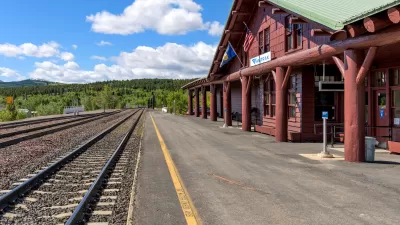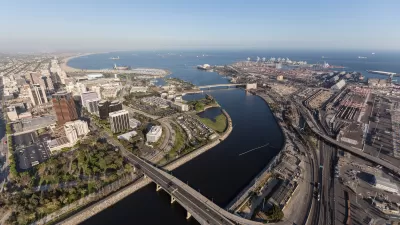The collapse of the I-35W bridge in Minneapolis puts the spotlight on the unsexy topic of infrastructure maintenance. But a smart growth policy, "Fix it First," has been focused in the area for some time. The policy, in place in Pennsylvania, Michigan, and for the last four years in Massachusetts, states that no new highways or bridges can be built until all existing infrastructure is in a state of good repair. Generally this meant stuff that was in and around existing cities; thus it's a smart growth policy, as the makeovers make cities and older suburbs more liveable and functional, while sprawl-enabling highway construction is limited.
The collapse of the I-35W bridge in Minneapolis puts the spotlight on the unsexy topic of infrastructure maintenance. But a smart growth policy, "Fix it First," has been focused in the area for some time. The policy, in place in Pennsylvania, Michigan, and for the last four years in Massachusetts, states that no new highways or bridges can be built until all existing infrastructure is in a state of good repair. Generally this meant stuff that was in and around existing cities; thus it's a smart growth policy, as the makeovers make cities and older suburbs more liveable and functional, while sprawl-enabling highway construction is limited.
In Massachusetts, when the engineers looked around and checked out what needed fixing up, the list was sobering. The Longfellow Bridge connecting Boston and Cambridge over the Charles River was scheduled for a $60 million restoration. The Storrow Drive tunnel must be fixed (one engineer said his official assessment was that the 50-year-old Beacon Hill/Back Bay tunnel absolutely will fail within five years, but his unofficial view was that it could cave in any day now). Doing this kind of maintenance is tedious, and even with the policy, scores of bridges are deficient. One study suggests we need to spend over four times the $2 billion currently set for infrastructure maintenance.
Most transportation money is still getting poured into new highways out into the cornfields. But maybe the tragedy will make that kind of highway and bridge construction a bit more shameful (see the bridge to nowhere, courtesy of Rep. Don Young and Sen. Ted Stevens from Alaska). That would be overdue, especially because the system seems to be trying to tell us something. I was out in Amagansett on Long Island last weekend, and on Saturday there were power outages and brownouts, as the grid was overtaxed. Gucci went dark and the pinot grigio warmed. It gives one the sense of being on borrowed time.

Alabama: Trump Terminates Settlements for Black Communities Harmed By Raw Sewage
Trump deemed the landmark civil rights agreement “illegal DEI and environmental justice policy.”

Study: Maui’s Plan to Convert Vacation Rentals to Long-Term Housing Could Cause Nearly $1 Billion Economic Loss
The plan would reduce visitor accommodation by 25% resulting in 1,900 jobs lost.

Planetizen Federal Action Tracker
A weekly monitor of how Trump’s orders and actions are impacting planners and planning in America.

Wind Energy on the Rise Despite Federal Policy Reversal
The Trump administration is revoking federal support for renewable energy, but demand for new projects continues unabated.

Passengers Flock to Caltrain After Electrification
The new electric trains are running faster and more reliably, leading to strong ridership growth on the Bay Area rail system.

Texas Churches Rally Behind ‘Yes in God’s Back Yard’ Legislation
Religious leaders want the state to reduce zoning regulations to streamline leasing church-owned land to housing developers.
Urban Design for Planners 1: Software Tools
This six-course series explores essential urban design concepts using open source software and equips planners with the tools they need to participate fully in the urban design process.
Planning for Universal Design
Learn the tools for implementing Universal Design in planning regulations.
Caltrans
Smith Gee Studio
Institute for Housing and Urban Development Studies (IHS)
City of Grandview
Harvard GSD Executive Education
Toledo-Lucas County Plan Commissions
Salt Lake City
NYU Wagner Graduate School of Public Service





























